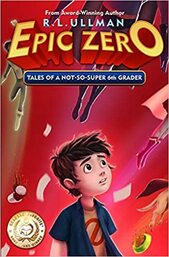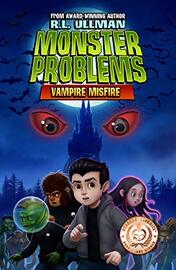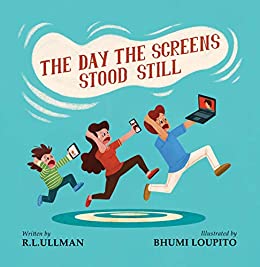 This is the fourth installment of my interview series with independantly published authors of middle-grade books. During this interview, I was pleasantly surprised to discover that, among other things, that R. L. Ullman is a fellow comic book fan--which should come as no surprise considering the books he has written. Enjoy the read! Who were some of your early inspirations as an author? I read across many genres, and there were many authors I admired. When I was young, my absolute favorite book was Watership Down. Richard Adams really captured my imagination with his band of rabbits, and I still go back and read it every few years. Growing up, I also read a ton of comic books and lots of fantasy. I absolutely loved David Eddings’ Belgariad series and all things Terry Brooks. Of course, when I got older and wanted to write professionally, I spent a lot of time studying J. K. Rowling. Her immersive world building is incredible. How did you get started as an author? Did you start by writing books or something else? I actually started by writing screenplays in my late twenties. At that time I was very focused on writing the next big comedy blockbuster. I had some interest in my stories, but nothing ever landed. Nevertheless, the tight confines of writing screenplays taught me how to economize words, develop story structure, and create compelling characters. It was a valuable experience, and everything I learned translated well to middle-grade books where you want to keep the action moving. What was your inspiration for the Epic Zero series? Epic Zero actually started as a screenplay. I’m a huge comic book guy. I used to have over 10,000 comics, but I’ve pared that down over the years. On top of that, when I was growing up I felt pretty ordinary. I wasn’t great at sports, like my siblings. Then one day, an idea came to me about a boy who grows up in a family of superheroes, but he doesn’t have any superpowers. Talk about being ordinary to the extreme! I wrote it up as a screenplay but couldn’t find any takers, so I put it away. It was only after my son was born that I remembered that screenplay and thought it might make a fun book for kids. How about Monster Problems? After I’d written the first three Epic Zero books, I thought I’d try my hand at something new. As they say, “write what you know,” so I thought I’d create another unlikely hero I could base a series off of. Then one day while shaving, I had the idea of an orphan kid who thought he was just quirky but comes to realize he’s half-vampire and destined to save the world from Count Dracula. That series was a lot of fun as I was able to create my own unique twist on classic monster mythology. What draws you to write for middle-grade readers? Do you plan to write for other audiences too? I love writing for middle-grade readers. I really enjoy creating characters that kids can relate to. My eleven-year-old son is a great audience and helper. I also just released a picture book called The Day the Screens Stood Still that encourages kids (and the thumb-scrolling grown-ups who love them) to be more mindful of screen time and family time balance. That was a fun project, and I hope to do more picture books in the future. What motivated you to publish independently rather than going the traditional route? There is nothing wrong with either route, and I can see myself going traditional with future projects as well. However, I really enjoy developing all aspects of the finished product, from the title to the cover to the interior illustrations. Publishing independently give you more control over the full reader experience. Also, the marketing aspects can be fun as well. Do you do this full time, or is writing more of a part-time gig? Up until recently I was working a full-time job and writing as a side hustle. Unfortunately, I lost that job, and now I’m considering writing full time. I think I can get more books out and do a better job of marketing them if it’s my sole focus. What are some of the biggest benefits of being an independent author? I think having complete creative control over the final product is one of the biggest advantages of being an independent author. I also think you can keep your books evergreen as an independent author. There are always new readers entering middle grade, and I’ve seen quite a few traditional books that were hot a few years ago fade away as publishers move their focus and marketing investment into newer titles. What are some of the biggest challenges? I think the #1 challenge is visibility. As an independent author, you are putting the marketing investment behind your books, and there is a lot of competition out there. Your books may be flying high one week, and then sales sag as a new crop of traditional and independent books hit the scene. Ensuring your books stay visible is a critical and ongoing challenge to attract new readers. What are you working on right now? Right now, I’m working on Epic Zero 9, which is coming along great! As mentioned, I’ve also just launched my debut picture book, The Day the Screens Stood Still, so I’m trying to get the word out about that one. Then I have a bunch of new middle-grade concepts I’m working on and will dive into one of those soon. Since I now have the time, I’m planning to use it wisely!
0 Comments
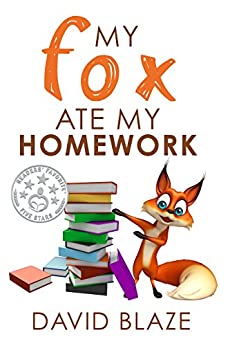 Like many of the authors featured in this interview series, David Blaze's books first came to my attention when I was setting up Amazon ads for my books. As I looked at the best-sellers in various middle-grade categories, his book My Fox Ate My Homework kept coming up. Later, I've gotten to know David and learn more about him as part of a middle-grade mastermind group started by Steven K. Smith. In addition to writing his own books, David also did a novelization of the movie Frozen II. However, like me, David publishes the rest of his books independently, which makes him my kind of guy. To learn more about David, visit his website. Who were some of your early inspirations as an author? I grew up with stories like Charlotte’s Web by E. B. White and The Velveteen Rabbit by Margery Williams. Many years later, when I decided to write books for kids, I studied the one book that looked the most interesting to me – Diary of a 6th Grade Ninja by Marcus Emerson. His work made me feel inspired and confident I could write for kids. How did you get started as an author? Did you start by writing books or something else? I started writing short stories for adults back in 2013. These were mostly horror and suspense. This was when I had one year of free time because I was disabled and had to stay home. I remembered how much I loved writing poems and stories when I was younger and for the first time in my adult life, I had a ton of time to write. What was your inspiration for the "My Fox . . ." series? I’ve only ever seen a red fox once, on a nature trail when I was kid, and have always been intrigued by it. Much of the My Fox series is based on my childhood, sans the talking fox. What draws you to write for middle-grade readers? Do you plan to write for other audiences too? It’s funny you ask this question because I realized the reason only recently. My earliest memories start at age 9. I’ve done school presentations for preschool through the sixth grade. No matter how many books I write and for how many ages, the greatest response I get is always from third graders. They are the ones who contact me (well, their parents do) to say how much they love my books. Sure, I hear from other grades and ages, but they are by far the biggest fans. I’ve written books for early readers, middle grade, teens, and adults. As of now, I don’t have any intention of returning to any group but middle grade. What motivated you to publish independently rather than going the traditional route? When I was a teenager and young adult, I submitted stories to magazines and book publishers. I always got back form rejection letters and sometimes short notes about how I didn’t have what they were looking for at the time. This discouraged me from writing stories and books until the year I was temporarily disabled. Some time later I read an article about Amazon Kindle and how to self-publish on it. I was intrigued by the idea of publishing directly online without anyone rejecting it. I published my short stories in a book collection the next day. At what point did you realize you could do this full time? What was the tipping point? Less than six months after writing my first MG book, My Fox Ate My Homework, I was making as much money from it as I was working full time. I’m a realist and knew it might not last forever. However, in the following months, as I released more books in the series, I made more and more money. I set a goal of maintaining that income for a full year before I considered leaving my job. I also made sure I had a minimum amount in savings in case there were months when my sales declined (this turned out to an extremely smart decision!) I did it! What are some of the biggest benefits of being an independent author? The biggest benefit to me is the time I get to spend with my son. If he’s ever sick, I’m here to stay home with home. School events? Spring break? Summer? I’m here for my son while my wife works. This works for her because she loves to work and can’t imagine staying home. I work by my own schedule. Sometimes I go weeks without writing (still working story details in my head). Sometimes I go months without coming up for air. I’ve never been a fan of being told what to do, so figuring out things for myself is awesome! What are some of the biggest challenges? Time is the biggest challenge. I incorrectly believed I would have more time to write without a job. The same things I’m grateful for (time with my son) take a ton of time away. His ADHD requires constant attention and makes it impossible to write when we’re home together. I’ve also found it impossible to change my sleeping schedule. I’ve always been a late-night person (even as a teen), so that’s when I write. In the end, I have the same amount of time to write as I did when I was working full time (I wrote when I got home after midnight). What are you working on right now? I’m working on an interactive superhero book (middle grade, of course!). I feel great writing for this age group again. My son was home most of last year because of COVID, so the little writing I got done wasn’t even for middle grade. But I’m back! 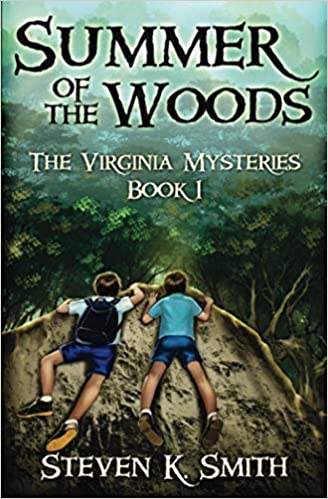 The second in my series of interviews with other middle-grade authors is Steven K. Smith, creator of the Virginia Mysteries Series, Brother Wars, and other books. Steve first came to my attention when I looked up my own books on Amazon and kept seeing his smiling face under the header, "People who bought this book also bought . . ." Then I got to meet him and several other authors virtually when Steven started a "middle-grade mastermind" group that he invited me to attend. After hearing about his experiences as an independent author, I thought he would be a great person to feature here. Who were some of your early inspirations as an author?
The biggest inspirations for me were books that I read when I was younger, things like the Chronicles of Narnia, Where the Red Fern Grows, Bridge to Terabithia, and those kinds of books. There’s something about books that you read when you’re in those years from 8-12. You’re filled with wonder and starting to explore and figure things out about the world and yourself. It’s a magical time, and books can play such a part in that. Even now as a grown-up, those are some of the books that were most impactful in my life. How did you get started as an author? Did you start by writing books or something else? My wife and I have three boys, and when my youngest was born about twelve years ago, I started a blog called MyBoys3 about being a dad to three little boys who were all five or under. I wrote a couple times a week about all our crazy adventures, changing diapers, pretending the UPS truck was chasing us, going camping, playing sports, and all kind of things. I always enjoyed writing in school, and my first job out of college was as a correspondence writer for the Pennsylvania State Legislature (extremely boring!). So, blogging got my creative juices flowing again after a long break, and perhaps most importantly, it also got me used to other people reading my words from the heart, which proved crucial when I started publishing books. What was your inspiration for the Virginia Mysteries Series? About midway through my blogging efforts, we moved from New Jersey to just outside Richmond, Virginia. I started making up a bedtime story for my two older boys about a couple of brothers who moved from up north to Virginia and started having adventures in the woods behind their house and looking for a treasure of valuable coins. It happened to be a lot like our house and woods, and the brothers started out a lot like my older two sons. I love history, and everywhere I went around Richmond seemed to be dripping with history. Sometimes it’s helpful to start writing about things you know and then see where things go from there. How about Brother Wars? Is this series at all autobiographical? Brother Wars started off as a short story called “Pitch Black Dark” about two brothers who lock each other in their dark basement. I got the idea when one of my son’s friends said he didn’t want to play in our basement when the lights were turned off because it was, in his words, “pitch black dark down there.” Which gave me an idea! I didn’t have brothers growing up, just a little sister who I thought was super annoying. But I certainly steal ideas and dialogue from things my kids say and do. I get a lot of positive feedback about the characters’ interactions feeling authentic, and I think that mostly comes from breathing it in at home all the time. What draws you to write for middle-grade readers? Do you plan to write for other audiences too? Like I said, middle grade books have always been special to me, but the fact that I have kids definitely influenced what I started writing. The fact that other readers have responded well to my stories took me down a path that I never expected. I also really love getting to meet and talk with young readers at schools and other events. Seeing the inspiration and excitement in their eyes and hearing teachers and parents talk about how a former reluctant reader is now devouring my books and excelling in school is a reward I’d never considered. I also have two books for adults: a parenting memoir (Splashing in the Deep End) that is an edited compilation of all my blog posts and a coming-of-age/contemporary romance called Harborwood that I published under the name Steven Sawyer. I haven’t had the time to focus on that aspect, but maybe I’ll add to it more down the line. What motivated you to publish independently rather than going the traditional route? I never really intended to make this a career, and when I started looking into publishing options, the traditional route seemed like it took way too long for my patience level. I enjoy the small business aspect of my work as much as the writing part. It’s a lot of fun to be fully at the wheel of my career, be able to track my progress, and not have to ask for anyone’s permission. I worked for twenty years at an Internet startup in Manhattan, so the entrepreneurial side of things was very interesting to me. At what point did you realize you could do this full time? What was the tipping point? Even after I started publishing, I thought success could look like letting me retire a year or two earlier on the back end someday. But surprisingly, people were buying and enjoying my books, and I got a bit hooked on writing them. Within a few years, it felt like I had two full-time jobs and wasn’t spending the time with my family that I needed and wanted to. So, three years ago, I made the leap and quit the day job. The first year was touch and go, and I was starting to think I might need to look for something else. Thankfully, the past two years have seen significant growth, so for the time being, I’m good! I tell students that I get to make up stories and talk about them, which is a lot better than a real job! I feel extremely blessed that things have worked out this way and hope that it can be an example to my kids and others that sometimes you have to take a chance and try something. I didn’t want to look back and wonder what might have happened if I’d given it a go. What are some of the biggest benefits of being an independent author? Being in charge, charting your own course, a greater financial upside, much faster timeline. I’d never had my own business before, and it’s a fun kind of challenge to know that things rest on me to get it done. The best approach is to try to make my books look, feel, and read as good as any traditionally published book. Readers don’t care who the publisher is; they just want a great book. What are some of the biggest challenges? It’s on me to get things done, which means if I don’t get it done . . . it’s on me! Especially when I started out, there was a ton of negative stigma about self-publishing. Much has changed over the past eight years as more and more people are going the indie route. I like to tell the story that early on, when I had only two books (and covers that I’d entirely or partially made myself), I approached the owners of a great local independent children’s bookstore in town and asked if they’d carry my books. They smiled and basically said, “Thanks, but don’t hold your breath.” I kept learning, writing more books, getting better covers, better editing, and spreading the word locally at schools and festivals. A little over a year later, the bookstore reached out to me and said that schools were asking about my books and wondered if I would be open to the shop carrying them and maybe doing a signing. That was a good day. What are you working on right now? I’m a few chapters in on my tenth book in the Virginia Mysteries Series. Despite many attempts to change, I tend to write in batches throughout the year, which means it always takes me a little while to get moving again and regain my drafting flow, but it’s starting to come around. This book will be tied into history around Virginia Beach and notorious pirates like Blackbeard who once sailed those waters. My last book was about civil rights history, so I wanted to do something on a little lighter topic this time. I try to remind myself that writing a book is a bit like fitting together a puzzle. You have to keep working on it a little each day, and gradually the picture comes into focus. To learn more about Steven, visit his website or visit his author page on Amazon. I've never featured an interview on this blog before, but it's something I plan to do regularly this year to help feature some of the other great middle-grade authors and series out there. 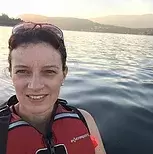 First out of the gate is fellow Canadian author and British Columbia resident Rae Knightly (although she's also lived in Mexico City, Brussels, Tucson, Edinburgh, and Cape Town), author of the Alien Skill Series. Below is a quick overview of the series, followed by my interview with her. When UFOs crash into the fields next to his grandfather’s house, twelve-year-old Ben Archer becomes a cumbersome witness in the eyes of the government. Not only that, but Ben discovers he has been entrusted with an alien power, the significance of which could jeopardize human life on Earth. Hi, Rae. What was your initial inspiration for the Alien Skill Series?
My aim was to create a story set in the real world where a young protagonist is faced with fantastical situations. I figured that idea alone would allow readers to be transported from their normal lives into a world of adventure and wonder. Based on that, I either needed to enter the realm of fantasy or science-fiction, and since I have a soft spot for aliens (because I’m sure some form of alien life exists out there), I decided this fantastical element would come from an encounter with an alien being. My main character (Ben Archer) goes on the run from government agents with this alien (Mesmo), without knowing the extraterrestrial’s true intentions. From there the story began to unfold as I wrote it, with Mesmo’s mission on Earth becoming ever clearer and linked to current events in the real world. What I enjoy the most, though, is developing interactions between characters and finding out who they are, what their goals are and what it means to become a hero. Who were some of your early inspirations as a writer? As a single child, books were my companions, and I devoured all the Famous Five, Secret Seven, Nancy Drew, and Hardy Boys books. The Dark is Rising trilogy by Susan Cooper definitely topped my list. I also read and reread many books by Monica Hughes (such as Earthdark) and Lois Duncan (such as Stranger with my Face). I devoured Terry Brooks’ The Shannara Chronicles, The Ice People by Rene Barjavel, Island of the Blue Dolphins by Scott O'Dell,and Paulo Coehlo’s The Alchemist. What draws you to write for middle-grade readers? To be honest, I thought I was writing for young adults, but after consulting with more experienced authors and editors, I heard about middle-grade books. I was thrilled to fall in that category! After all, it’s at that age (around eleven or twelve) that I discovered a love for reading, so it seemed fitting to deliver magic and adventure to that same age group. What made you decide to self-publish your series? When you’ve never written or published anything before, it’s hard to know if your stories will strike a chord with readers. I figured that going the traditional route was a long shot, so I decided to self-publish instead and get some feedback. Things grew from there and I’m over the moon with the way things are going! What are some of the biggest benefits of being a self-published author? The biggest benefit is that I have total control over my work. Since writers are creative people, self-publishing allows us to express our creativity in any way we wish, not only in terms of writing but also in terms of marketing. For example, I love to post pictures of nature but don’t enjoy taking selfies. That means Instagram is a good platform for me, whereas I struggle with TikTok. Fortunately, I discovered that I enjoy marketing just as much as I enjoy writing, which is a blessing because marketing books can take as much time as writing them! I am my own boss, I adjust my working hours according to my family’s needs, and I have learned to treat my writing as a business. What are some of the biggest challenges of publishing independently? The biggest challenge is that I have total control over my work. Yes! You read that right! Because I have total control over my work, it also means I have to do everything on my own: come up with story ideas, write them, find editors and book cover designers, find readers, figure out publishing platforms, such as Amazon Kindle Direct Publishing and IngramSpark, study marketing strategies, figure out tax issues, maintain active social media platforms and a functional website . . . The tasks are endless! Sometimes I wish I could clone myself, so one person could write and the other could do all the administrative tasks. How do you go about creating your book covers? I found my book cover designer on the website 99designs. It turned out to be the best investment I ever made. I ran a contest on 99designs and received eighty book cover submissions from which to choose. I chose four covers and asked reader groups to vote for their favourite. In essence, I let the public pick the book cover, which is how you are going to capture readers; attention in the first place. Sometimes it’s not about what the author wants but what readers want, and nothing is truer than for a book cover. What are you working on right now? I’m currently wrapping up book 6 in the Alien Skill Series. It’s been a wonderful, emotional adventure, but I must now tell a story of another hero in The Lost Space Treasure Series, which has its roots in the same universe as the Alien Skill Series. I plan to publish this new series in early 2022. |
Kevin MillerBrief thoughts and updates on writing, publishing, and life Archives
June 2024
Categories
All
|
 RSS Feed
RSS Feed
